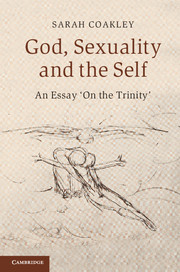Book contents
- Frontmatter
- Contents
- Illustrations
- Preface and acknowledgements
- Abbreviations
- Prelude: the arguments of this book
- Chapter 1 Recasting ‘systematic theology’: gender, desire, and théologie totale
- Chapter 2 Doing theology ‘on Wigan Pier’: why feminism and the social sciences matter to theology
- Chapter 3 Praying the Trinity: a neglected patristic tradition
- Chapter 4 The charismatic constituency: embarrassment or riches?
- Chapter 5 Seeing God: trinitarian thought through iconography
- Chapter 6 ‘Batter My Heart’: reorientations of classic trinitarian thought
- Chapter 7 The primacy of divine desire: God as Trinity and the ‘apophatic turn’
- Coda: conclusions and beyond
- Glossary of technical terms and names
- Scripture index
- General index
- References
Chapter 6 - ‘Batter My Heart’: reorientations of classic trinitarian thought
Published online by Cambridge University Press: 05 June 2014
- Frontmatter
- Contents
- Illustrations
- Preface and acknowledgements
- Abbreviations
- Prelude: the arguments of this book
- Chapter 1 Recasting ‘systematic theology’: gender, desire, and théologie totale
- Chapter 2 Doing theology ‘on Wigan Pier’: why feminism and the social sciences matter to theology
- Chapter 3 Praying the Trinity: a neglected patristic tradition
- Chapter 4 The charismatic constituency: embarrassment or riches?
- Chapter 5 Seeing God: trinitarian thought through iconography
- Chapter 6 ‘Batter My Heart’: reorientations of classic trinitarian thought
- Chapter 7 The primacy of divine desire: God as Trinity and the ‘apophatic turn’
- Coda: conclusions and beyond
- Glossary of technical terms and names
- Scripture index
- General index
- References
Summary
In the last three chapters I have taken the reader on diverse ‘foraging raids’ into the history and contemporary practice of trinitarianism, with the aid of the interdisciplinary techniques of a théologie totale, and with the special impetus thereby to search for doctrine’s lost coins in dark and neglected corners. I have tried above all to demonstrate how deeply trinitarian conceptuality ‘bites’ in unexpected places, how strangely it permeates even the most basic human preoccupations with sex, power, pain, death, and primary parental relationships; and, at the very least, what I hope will have emerged from these explorations of text, fieldwork, and art is some substantiation of my claim that no doctrine of the Trinity, as charter and paradigm of perfect relationship, can be completely innocent of political, familial, and sexual associations. Whatever the abstract form of trinitiarian ontological speculation in its purest conceptual and theological expression, its implications reach all the way down, personally and culturally, and spiral outwards in ways often beyond the control of ecclesiastical authorities.
But that is not all; for other, doubtless more contentious, sub-theses have been at work in what I have said so far. There has been a sociological hypothesis about ‘church’-type Christianity’s need for a subversive element within its bounds if trinitarianism is to be perennially reinvigorated by response to the Spirit; and a concomitant hypothesis about the (relative) suppression of a ‘prayer-based’, or ‘incorporative’, doctrine of the Trinity within the ‘church’ type, for fear of its liberating or potentially disordering implications.
- Type
- Chapter
- Information
- God, Sexuality, and the SelfAn Essay 'On the Trinity', pp. 266 - 307Publisher: Cambridge University PressPrint publication year: 2013



